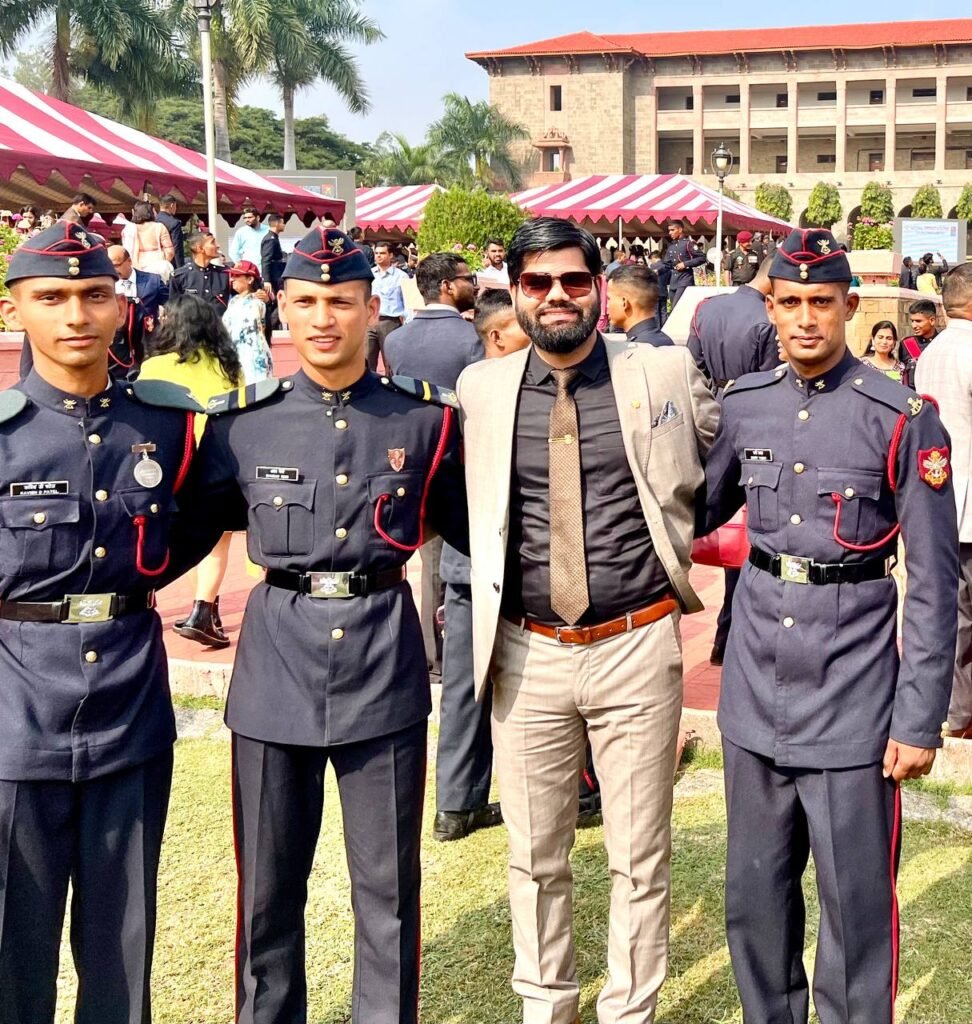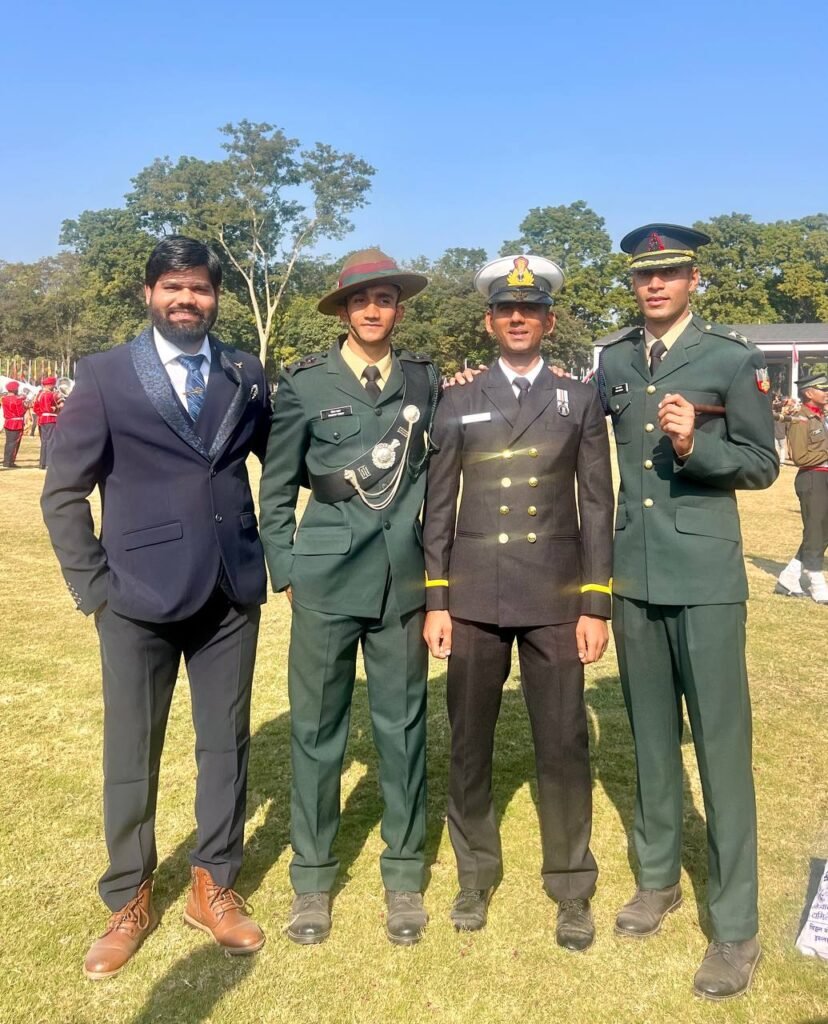Are you dreaming of a career in the armed forces but feeling overwhelmed by the choices? You’re not alone. Many aspiring candidates find themselves at a crossroads, torn between the National Defense Academy (NDA), Combined Defense Services (CDS), and Special Service Bureau (SSB). 🤔
Each path offers a unique journey towards serving your nation, but which one is the perfect fit for you? The decision can be daunting, with each option presenting its own set of challenges and rewards. But fear not! Understanding the nuances of these career paths is the first step towards making an informed choice that aligns with your aspirations and strengths.
In this comprehensive guide, we’ll dive deep into the world of NDA, CDS, and SSB. We’ll explore the distinct features of each path, helping you uncover the factors that truly matter in your decision-making process. From entry requirements to career progression, we’ll leave no stone unturned. So, buckle up and get ready to embark on a journey of discovery that could shape your future in the armed forces! 🚀
Understanding the Three Career Paths

A. NDA: Serving in the Armed Forces
The National Defense Academy (NDA) is a prestigious institution that offers a unique pathway to a career in the Indian Armed Forces. Cadets undergo rigorous training to become commissioned officers in the Army, Navy, or Air Force.
Key features of NDA:
- Entrance exam for 10+2 students
- 3-year training program
- Opportunity to serve in any of the three defense services
B. CDS: Combined Defense Services
The Combined Defense Services (CDS) exam is another route to join the Indian Armed Forces as an officer. It’s designed for graduates and final-year students.
CDS opportunities:
- Indian Military Academy (IMA)
- Indian Naval Academy (INA)
- Air Force Academy (AFA)
- Officers Training Academy (OTA)
C. SSB: Joining the Special Service Bureau
The Special Service Bureau, now known as the Sashastra Seema Bal, is a border guarding force under the Ministry of Home Affairs. It offers a unique career path in national security.
SSB roles:
- Border protection
- Intelligence gathering
- Counter-insurgency operations
D. Key differences among the three options
| Aspect | NDA | CDS | SSB |
|---|---|---|---|
| Age limit | 16.5 to 19.5 years | 19 to 24 years | 18 to 25 years |
| Education | 10+2 | Graduation | 10+2 or Graduation |
| Training duration | 3 years | 1 to 1.5 years | 44 weeks |
| Career path | Armed Forces officer | Armed Forces officer | Paramilitary officer |
Now that we’ve outlined the basic structure of these three career paths, let’s delve deeper into the National Defense Academy and what it offers to aspiring military officers.
National Defense Academy (NDA)

A. Eligibility criteria and selection process
To join the National Defense Academy (NDA), candidates must meet specific eligibility criteria and undergo a rigorous selection process:
- Age: 16.5 to 19 years
- Education: 10+2 or equivalent with Physics and Mathematics
- Nationality: Indian citizen
The selection process involves:
- Written exam
- SSB interview
- Medical examination
| Stage | Details |
|---|---|
| Written exam | Covers Mathematics, General Ability Test |
| SSB interview | 5-day process testing officer-like qualities |
| Medical exam | Comprehensive health assessment |
B. Training and education provided
NDA offers a comprehensive 3-year training program:
- Academic education (B.Sc. or B.A. degree)
- Military training
- Physical fitness
- Leadership development
C. Career progression and opportunities
NDA graduates enjoy diverse career paths:
- Commission into Army, Navy, or Air Force
- Rapid promotions
- Specialized roles (e.g., pilots, submariners)
- Post-retirement opportunities in civilian sectors
D. Pros and cons of choosing NDA
Pros:
- Early entry into military career
- Prestigious and comprehensive training
- Strong camaraderie and networking
Cons:
- Rigorous training and discipline
- Limited personal time during training
- Long-term commitment required
Now that we’ve explored the NDA path, let’s examine the Combined Defense Services (CDS) option to understand how it differs and what unique opportunities it offers.
Combined Defense Services (CDS)

A. Entry requirements and exam structure
To join the Combined Defense Services (CDS), candidates must meet specific eligibility criteria and pass a rigorous selection process. Here’s a breakdown of the entry requirements and exam structure:
| Requirement | Details |
|---|---|
| Age Limit | 19-24 years (varies for different branches) |
| Educational Qualification | Bachelor’s degree (12th pass for Naval Academy) |
| Nationality | Indian citizen |
| Marital Status | Unmarried |
The CDS exam consists of two stages:
- Written Examination:
- English
- General Knowledge
- Elementary Mathematics (for Army and Air Force only)
- SSB Interview:
- Intelligence and Personality Test
- Group Testing Officer Tasks
- Interview
- Conference
B. Available branches and specializations
CDS offers various career options across different defense services:
- Indian Military Academy (IMA)
- Indian Naval Academy (INA)
- Air Force Academy (AFA)
- Officers Training Academy (OTA)
Each branch provides specialized training and unique career opportunities within the Indian Armed Forces.
C. Training duration and curriculum
The training duration varies depending on the chosen branch:
- IMA and INA: 3 years
- AFA: 1 year
- OTA: 49 weeks
The curriculum includes:
- Physical fitness and endurance training
- Weapons handling and tactics
- Leadership and management skills
- Technical and specialized training specific to each branch
D. Career growth and advancement prospects
CDS offers excellent career growth opportunities:
- Regular promotions based on performance and tenure
- Specialized courses and advanced training
- Leadership roles and command positions
- Post-retirement opportunities in government and private sectors
E. Advantages and challenges of CDS
Advantages:
- Prestigious career in the armed forces
- Job security and financial stability
- Opportunity to serve the nation
- Diverse career options within defense services
Challenges:
- Highly competitive selection process
- Rigorous training and physical demands
- Frequent postings and relocations
- High-stress work environment
With this comprehensive understanding of the Combined Defense Services, let’s explore the Special Service Bureau (SSB) and its unique aspects in the next section.
Special Service Bureau (SSB)
Role and responsibilities of SSB
The Special Service Bureau (SSB) plays a crucial role in India’s internal security and border management. SSB personnel are responsible for:
- Safeguarding the Indo-Nepal and Indo-Bhutan borders
- Conducting counter-insurgency operations
- Providing disaster relief and management
- Gathering intelligence in border areas
Selection procedure and eligibility
The SSB selection process is rigorous and multi-staged:
- Written exam
- Physical fitness test
- Medical examination
- Personal interview
Eligibility criteria:
- Age: 18-25 years
- Education: Graduation from a recognized university
- Physical standards: Height, weight, and chest measurements as per SSB norms
| Test | Minimum Requirement |
|---|---|
| Run (1.6 km) | 6 minutes 30 seconds |
| Push-ups | 20 repetitions |
| Sit-ups | 25 repetitions |
| Chin-ups | 6 repetitions |
Training and skill development
SSB training is comprehensive and intensive, focusing on:
- Combat skills and tactics
- Intelligence gathering techniques
- Border management strategies
- Disaster response and management
- Physical fitness and endurance
Career benefits and limitations
Benefits:
- Job security and stable career growth
- Opportunity to serve the nation
- Diverse skill development
- Pension and healthcare benefits
Limitations:
- Frequent postings in remote areas
- High-risk nature of the job
- Limited family time due to demanding schedules
Now that we’ve explored the Special Service Bureau, let’s consider the factors that can help you choose the right path among NDA, CDS, and SSB.
Factors to Consider When Choosing Your Path

A. Personal interests and strengths
When deciding between NDA, CDS, and SSB, it’s crucial to assess your personal interests and strengths. Each path offers unique opportunities and challenges, so aligning your choice with your natural inclinations can lead to a more fulfilling career.
| Career Path | Key Interests | Strengths Required |
|---|---|---|
| NDA | Leadership, Strategy | Physical fitness, Academic excellence |
| CDS | Specialized roles, Technical expertise | Analytical skills, Adaptability |
| SSB | Intelligence, Covert operations | Quick thinking, Stress management |
Consider the following:
- Academic preferences: NDA requires a strong foundation in mathematics and science.
- Leadership potential: All paths demand leadership, but NDA emphasizes it from the start.
- Technical aptitude: CDS offers more specialized technical roles in various branches.
- Adaptability: SSB requires the ability to work in diverse and challenging environments.
B. Physical fitness and mental preparedness
Physical fitness and mental resilience are paramount in all three career paths. However, the specific requirements and challenges vary:
- NDA: Rigorous physical training from day one, emphasizing endurance and strength.
- CDS: Physical standards vary by service branch, with some roles being more demanding.
- SSB: Focus on both physical fitness and mental agility to handle high-stress situations.
Assess your current fitness level and willingness to commit to intensive training. Mental preparedness is equally important, as all paths involve high-pressure situations and decision-making.
C. Long-term career goals
Now that we’ve examined personal interests and physical requirements, let’s consider long-term career goals. Each path offers different career trajectories and opportunities for advancement.
| Career Path | Career Progression | Specialization Options |
|---|---|---|
| NDA | Rapid promotion track | Army, Navy, Air Force |
| CDS | Diverse roles, lateral entry | Technical, non-technical positions |
| SSB | Specialized intelligence roles | Covert operations, security |
Consider factors such as:
- Desired rank and position in the long run
- Opportunities for further education and skill development
- Post-retirement career prospects and transferable skills
D. Family considerations and lifestyle preferences
Lastly, it’s essential to weigh family considerations and lifestyle preferences. Military careers often involve frequent relocations, extended periods away from home, and potential deployment to challenging environments.
Factors to consider:
- Willingness to relocate frequently
- Impact on family life and relationships
- Comfort with high-risk situations
- Desire for a structured vs. flexible work environment
Each path offers a unique lifestyle, so align your choice with your personal values and long-term vision for your life and career. Remember, a successful military career requires not just individual commitment but also support from family and loved ones.
Preparing for Success in Your Chosen Path

Academic preparation and study resources
To excel in your chosen military career path, thorough academic preparation is crucial. Here are some key resources and strategies:
- Online courses: Platforms like Coursera and edX offer military-specific courses.
- Study materials: NCERT books, previous year question papers, and standard reference books.
- Coaching institutes: Reputable institutes specializing in NDA, CDS, or SSB preparation.
| Exam | Key Subjects | Recommended Books |
|---|---|---|
| NDA | Mathematics, General Ability | R.S. Aggarwal for Mathematics, Arihant’s NDA Guide |
| CDS | English, General Knowledge, Elementary Mathematics | Word Power Made Easy, Lucent’s GK, R.S. Aggarwal for Mathematics |
| SSB | General Knowledge, Current Affairs | Manorama Yearbook, newspapers |
Physical fitness training tips
Maintaining peak physical condition is essential for all military careers. Consider these tips:
- Develop a balanced workout routine focusing on cardio and strength training.
- Practice specific exercises required in physical tests (e.g., push-ups, sit-ups, running).
- Maintain a nutritious diet to support your fitness goals.
- Get adequate rest and recovery to prevent burnout and injuries.
Developing leadership and teamwork skills
Leadership and teamwork are cornerstones of military service. Enhance these skills through:
- Participating in group sports or team-based activities
- Taking on leadership roles in school or community organizations
- Volunteering for projects that require coordination and collaboration
- Attending leadership workshops or seminars
Interview and personality development strategies
Prepare for the interview and personality assessment stages with these strategies:
- Practice mock interviews with peers or mentors
- Stay updated on current affairs and military-related news
- Develop strong communication skills through public speaking practice
- Cultivate a positive attitude and work on stress management techniques
Remember, success in your chosen path requires dedication, perseverance, and a well-rounded approach to preparation. By focusing on these key areas, you’ll be well-equipped to face the challenges ahead and excel in your military career.

Choosing between NDA, CDS, and SSB is a significant decision that can shape your military career. Each path offers unique opportunities and challenges, catering to different aspirations and skill sets. The NDA provides a comprehensive foundation for a long-term military career, while CDS offers a chance to join the armed forces after graduation. SSB, on the other hand, focuses on specialized roles in border security and intelligence gathering.
As you consider your options, reflect on your personal goals, academic strengths, and physical fitness levels. Whichever path you choose, dedication, discipline, and continuous self-improvement will be crucial to your success. Remember, there’s no one-size-fits-all approach – the right choice is the one that aligns with your passion and long-term objectives in serving your country.
